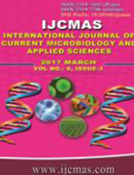


 National Academy of Agricultural Sciences (NAAS)
National Academy of Agricultural Sciences (NAAS)

|
PRINT ISSN : 2319-7692
Online ISSN : 2319-7706 Issues : 12 per year Publisher : Excellent Publishers Email : editorijcmas@gmail.com / submit@ijcmas.com Editor-in-chief: Dr.M.Prakash Index Copernicus ICV 2018: 95.39 NAAS RATING 2020: 5.38 |
To study the impact of artificial creation of soil fertility gradient strategy on soil fertility, nutrient uptake and green fodder yield of sorghum (var. CO 30) by following inductive methodology (fertility gradient concept), a field experiment was conducted during 2014-15 at farmer’s holding of Coimbatore district. The experimental field was divided into three equal strips and three graded levels of fertiliser N, P2O5 and K2O were applied in the form of urea, single super phosphate and muriate of potash, respectively to strip I (N0P0K0), II (N1P1K1) and III (N2P2K2). The N1 level was fixed based on the blanket recommendation of fodder sorghum and P1 and K1 levels were fixed based on the fixing capacities of phosphorus (100 kg ha-1) and potassium (80 kg ha-1) of the soil. Sorghum var. CO 30 was grown as a gradient crop and green fodder yield of sorghum was also recorded at harvest. At harvest, plant samples were collected and analyzed for their N, P and K contents and uptake of N, P and K was computed. The results confirmed that the application of graded levels of fertiliser N, P2O5 and K2O significantly influenced soil fertility status, NPK uptake and green fodder yield of sorghum.
 |
 |
 |
 |
 |